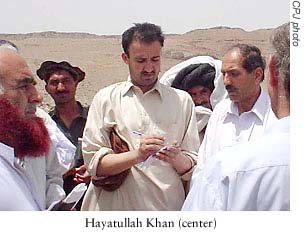
Pakistan: CPJ urges probe into journalist killings
Washington, June 21, 2006—The Committee to Protect Journalists met with Pakistan’s new ambassador to the United States today to press for an investigation into the killing of Hayatullah Khan and other journalists. Ambassador Mahmud Ali Durrani said he would convey CPJ’s concerns to his government when he visits Islamabad at the end of the week.
Attacks on the Press 2005: Pakistan
PAKISTAN Striking contradictions emerged during the sixth year of Gen. Pervez Musharraf’s rule. Baton-wielding police attacked journalists in several high-profile incidents, including two on World Press Freedom Day in May, even as the administration publicly proclaimed its commitment to press freedom. Journalists faced new threats of imprisonment for defamation and programming deemed “vulgar,” while the…
Attacks on the Press 2004: Pakistan
Pakistan As a key U.S. ally in the fight against terrorism, Pakistan’s president, Gen. Pervez Musharraf, intensified efforts to capture al-Qaeda and Taliban operatives in 2004. Musharraf also grew increasingly agitated by local and international reporting on alleged terrorist activities inside the country, deeming such coverage “antistate.” Journalists covering these sensitive issues faced growing obstacles…
Journalists Killed in the Last Ten Years
The Toll: 1995-2004 Each year in January, the Committee to Protect Journalists (CPJ) publishes a list of journalists killed in the line of duty around the world. This list has become the most widely cited press freedom statistic and is often seen as a barometer of the state of global press freedom. While the correlation…
Government bans ads to newspaper group
New York, March 15, 2004—Last week, Pakistan’s Information Minister, Sheikh Rashid Ahmed, acknowledged that the government had suspended advertising in newspapers belonging to the Nawa-i-Waqt Group of Publications, including the English-language daily The Nation and the Urdu-language daily Nawa-i-Waqt. He denied, however, that an official ban had been issued. In February, the government effectively stopped…
Attacks on the Press 2003: Pakistan
Although the press in Pakistan enjoyed greater freedom under its president, Gen. Pervez Musharraf, who took power in a military coup in 1999, journalists there still operate under pressure from the military, religious hard-liners, intelligence agencies, and the country’s antiquated blasphemy laws.
Attacks on the Press 2002: Preface
Many reporters find themselves in a dilemma when the press comes under attack. Our pride, our institutional and tribal loyalties, all clamor for a retort. We may be the bearers of bad tidings, but we are not their cause. If the truth is inimical to you, we want to argue, assailing us will not alter…
Attacks on the Press 2002: Asia Analysis
The vicious murder of Wall Street Journal reporter Daniel Pearl in Pakistan focused international attention on the dangers faced by journalists covering the U.S. “war on terror,” yet most attacks on journalists in Asia happened far from the eyes of the international press. In countries such as Bangladesh and the Philippines, reporters covering crime and…